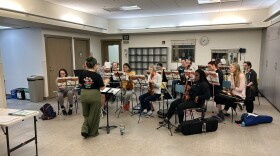The new system for high school seniors and college students to sign up for financial aid was supposed to be better. Instead, it has left many applicants helpless.
The Free Application for Federal Student Aid, known as the FAFSA, was streamlined and simplified for the next school year. However, technical glitches and delayed data have stalled the system.
“I have no control in this situation of what’s going on," said Chloe Schauermann, 17, who is a senior at Kearny High School and president of the school's Associated Student Body.
She applied to 15 colleges and submitted her FAFSA in January as soon as the new form was available.
“I just want to make sure I can pay for college. I come from a middle-class family, and I’ve been lucky enough to have a little bit of money saved. But it’s not enough to pay for four years of college," Schauermann said.
A major overhaul of the FAFSA culminated last year with a design that went from more than 100 questions to about 30. It was also supposed to directly connect IRS tax information to allow students and their families access to more money for college.
Because of the problems, the University of California and the California State University systems have delayed the date accepted students have to commit to attending until May 15. The extra time is in hopes they will know their financial aid status by then.
It’s the same problem at a community college or a four-year university. Everyone is waiting on work-around solutions to get the application process completed.
“My colleagues and I have been talking about this for months," said Silvia Marquez, UC San Diego's executive director of financial aid. "Our goal is to hold students harmless financially around all of this for this group of students because there is no path forward for them right now."
Marquez and her team are also working with students who have families classified as mixed status. That involves a student who is an American citizen and whose parents are undocumented.
Counselors at Mesa Community College's Dreamers Center are working to help applicants sort through the new FAFSA, which requires parents to submit a social security number to begin the process of financial aid.
“The concern would be maybe they don’t complete the application process altogether or maybe they don’t enroll because they’re uncertain whether they’re going to be able to finance their education,” said Saul Quiroz, Mesa College's financial aid director.
Get help with the FAFSA
Representatives from Federal Student Aid will be hosting a free federal financial aid webinar series. The sessions are geared toward students, their families and college access professionals
Register for the following webinars here.
- Feb. 20, 2024
- Understanding the new FAFSA submission summary.
- Why should I complete the 2024–25 FAFSA form?
- Feb. 21, 2024
- How to complete the 2024–25 FAFSA form as a dependent student.
- A parent’s guide to federal financial aid.
- Feb. 22, 2024
- Best strategies for comparing schools and financial aid offers using the U.S. Department of Education's college scorecard.
- How to complete the 2024–25 FAFSA form as an independent student.
Source: San Diego Unified School District
Waiting is the most effective advice that can be offered to students.
According to statistics gathered by the financial aid office at UC San Diego, as of Feb. 2, nearly 7,000 FAFSAs were submitted by students at 160 public and private high schools listed across the San Diego and Imperial County region.
That's half the amount submitted compared to this time last year.
“It’s just very stressful for me because I know a lot of colleges haven’t changed their deadlines yet for FAFSA. I feel like there hasn’t been enough communication between FAFSA and colleges," said Tyler Lieble, another senior at Kearny High School still waiting for answers.










